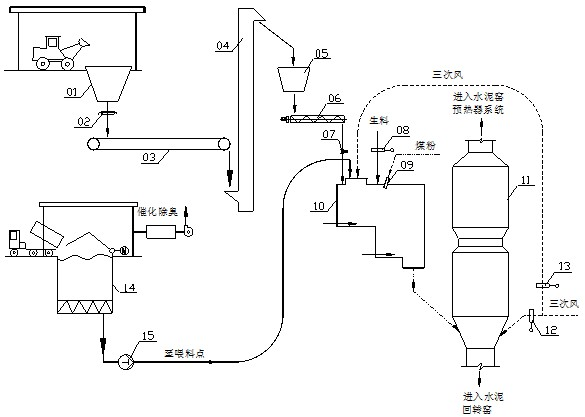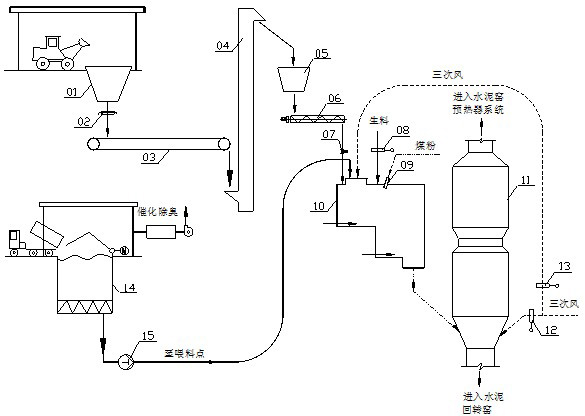Burning method for disposing wastes with various varieties and various phase states
A waste and multi-variety technology, applied in the field of waste treatment, can solve problems such as adverse effects of cement production, difficulty in adjusting incineration temperature, single material performance, etc., and achieve the effects of reducing fuel consumption, eliminating secondary pollution, and simple operation
- Summary
- Abstract
- Description
- Claims
- Application Information
AI Technical Summary
Problems solved by technology
Method used
Image
Examples
Embodiment 1
[0027] like figure 1 As shown, municipal solid waste is fed into the belt conveyor 03 through the discharge hopper 01 in the storage shed, and the flow is controlled by the discharge gate valve 02 in the middle. Then the waste is transported to the feeding hopper 05 through the elevator 04, and then unloaded from the feeding hopper 05 to the screw conveyor 06 and then fed into the incinerator 10, and the feeding pipe from the screw conveyor 06 to the incinerator adopts rotary feeding Device 07 carries out air lock.
[0028]The sewage plant sludge, waste oil sludge, waste engine oil, waste lubricating oil, etc. are buffered in the storage bin 14 to form a paste, and the waste is transported to the paste material port of the incinerator 10 through the plunger pump 15 . On the top of the incinerator, there are tertiary air (the temperature of the tertiary air is about 850-900°C) high-temperature tuyere, raw meal port, and burner 09. When the temperature in the incinerator 10 is ...
Embodiment 2
[0032] This embodiment is basically the same as Embodiment 1, and its difference is that the waste to be burnt is waste tires, and the time of staying in the incinerator is different. After 15 minutes, if the degree of incineration meets the requirements, the waste will be pushed into the second-level stacking platform through the pushing device of the first-level stacking platform, and the incineration will be completed after 10-15 minutes of incineration on the second-level stacking platform. .
Embodiment 3
[0034] This embodiment is basically the same as Embodiment 1, the difference being that the incinerated wastes are waste plastics, waste textiles, and waste paper, and the residence time in the incinerator is different, and they are incinerated on the first-stage stacking platform of the incinerator 10. , after 1-2 minutes of incineration, if the degree of incineration meets the requirements, the waste is pushed into the second-level stacking platform through the pushing device of the first-level stacking platform, and incinerated on the second-level stacking platform for 1-2 minutes. Incineration is complete in minutes.
PUM
 Login to View More
Login to View More Abstract
Description
Claims
Application Information
 Login to View More
Login to View More - R&D
- Intellectual Property
- Life Sciences
- Materials
- Tech Scout
- Unparalleled Data Quality
- Higher Quality Content
- 60% Fewer Hallucinations
Browse by: Latest US Patents, China's latest patents, Technical Efficacy Thesaurus, Application Domain, Technology Topic, Popular Technical Reports.
© 2025 PatSnap. All rights reserved.Legal|Privacy policy|Modern Slavery Act Transparency Statement|Sitemap|About US| Contact US: help@patsnap.com


